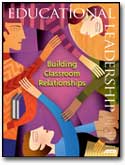Foremost among urban schools' challenges is the need to provide substantial academic, counseling, and financial support to help low-income students prepare for college. Yet many urban school districts face budget shortfalls even as their need for financial support increases. In California, the Oakland Unified School District is not immune to these challenges. Like many of its urban counterparts, the district is undergoing tough scrutiny and upheaval as a result of budget concerns and standards-based reforms.
Oakland's Project SOAR (Successful Options for Academic Readiness) offers hope and innovative strategies that improve district students' chances of college entrance and success. Funded by a five-year GEAR-UP (Gaining Early Awareness and Readiness for Undergraduate Programs) grant from the U.S. Department of Education and partnered with California State University at Hayward, the project is working to prepare a cohort of approximately 3,500 students to enter college in 2005.
When the project began in 1999, these students were entering 7th grade in 15 middle schools throughout the district. Now in the final year of the initiative, the students are entering 11th grade in the city's six comprehensive high schools. The project serves predominantly African American (45 percent), Latino/Mexican (27 percent), and Asian (23 percent) students through special partnerships with parents, the community, and local institutions of higher education.
Project SOAR provides a wide range of services, including tutoring and summer programs to promote academic achievement; professional development for tutors and teachers; counseling for preparing for college; programs for increasing parent involvement; and take-home computers and computer training.
Promoting Academic Achievement
Tutoring
Project SOAR provides stipends to 65 tutors—24 full-time and 41 part-time—who work with classroom teachers in all six schools. The project also provides academic counseling assistants who coordinate tutors and parent volunteers and staff classrooms during lunch periods for tutoring and other extended learning opportunities. Project SOAR's ReSOARce Centers at each site provide a place for tutors and parent volunteers to work with students both during the school day and after school. Teachers can refer their students to the ReSOARce Center for one-on-one tutorial sessions in reading, math, science, and social studies. To facilitate their collaborative relationship, teachers and tutors also attend training programs in September and January.
Tutors also assist SOAR's academic counselors with test preparation and administration. Last year, for example, tutors worked with classroom teachers to encourage 10th grade students to take the Preliminary Scholastic Achievement Test (PSAT) as practice before taking the test in 11th grade. This year, tutors will conduct ongoing workshops throughout the year to help students prepare for the PSAT, the SAT, and the California High School Exit Exam.
Summer Programs
Knowing that preparing for college is a year-round endeavor, Project SOAR has conducted summer programs for each year of the project. In 2000, SOAR 2 College Summer University programs at Merritt College and California State University at Hayward worked on building students' academic skills, self-confidence, and leadership skills.
When the cohort was ready to enter 9th grade in 2001, Project SOAR designed and implemented the Rising 9th Grade Summer Prep program, which focused on academic skills needed for high school subjects, such as algebra, and on teaching life skills, including time management, avoiding peer pressure, and preparing timelines for taking advanced placement courses and college entrance examinations. Participants' weekly field trips included visits to the Lawrence Livermore Labs and the Lawrence Hall of Science. Students who completed the summer program earned credits toward high school graduation and gained a better understanding of how to deal with high school and prepare for college.
In summer 2002, Project SOAR students learned more about college through the SOAR 2 College Summer Program. Through collaborative planning among Project SOAR, Peralta Community College District, and California State University at Hayward, incoming 10th graders from all six partner high schools lived on a college campus for two weeks and were able to earn both college and high school elective credits. They enrolled in college-level courses that focused on orientation to college, successful skills for college students, and career planning. In addition to attending classes taught by college instructors, students participated in field trips, mock interviews, Internet explorations, and library scavenger hunts. At the end of the summer, Cesar Elenes of Castlemont High School expressed the feelings of many of his fellow students: “Thank you for giving me the experience of feeling like a college student.”
In summer 2003, 361 SOAR students attended two two-week sessions of our SOAR 2 College with No Child Left Behind program at California State University at Hayward and Merritt College. Students learned more about preparing for college and attended college-level classes in English and statistics.
Professional Development
Teacher quality is one of the most important variables affecting student achievement (Barth, 1988). Students who receive effective instruction graduate from both high school and college in greater numbers. To ensure student success, we provide professional development for teachers to make the best possible use of support staff in the classroom, and we program time for ongoing collaboration and planning between core subject teachers and tutors. The project's academic coordinator conducts regular teacher/tutor planning meetings at each high school.
Project SOAR also offers periodic full-day professional development training for teachers and tutors to learn and discuss instructional strategies and to address learners' needs in core content areas.
Guidance and Counseling Support
Because Project SOAR's motto is “Early awareness and preparation equal success,” our 15 academic counseling assistants play a major role in ensuring that all students know what they need to do to go to college. These counselors represent SOAR on campus through information centers and facilitate tutor placement and communication between tutors and teachers. Project SOAR provides guidance and counseling support in small-group and one-on-one sessions, and counselors use test data and assessments to design academic support systems. By analyzing students' SAT-9 scores, grade point averages, and PSAT scores, counselors target students in need of assistance and coordinate tutor involvement accordingly.
Encouraging Parental Involvement
Students whose parents are actively involved in their education often experience higher academic achievement (Bronfenbrenner, McClelland, Wethington, & Moen, 1996) and have better relationships with their teachers. Project SOAR is committed to providing support to parents. Each of our cohort schools has a trained parent liaison whose primary tasks are to increase parent involvement and advocacy at the school, provide information about project activities and school events, and promote college awareness and readiness.
Project SOAR trains parent liaisons to be knowledgeable about parent resources at both the site and district level. Bilingual parent liaisons assist the non-English-speaking parents. As a team, the parent liaisons assist parents with problems affecting their children in school and serve as advocates for each student's educational process.
Project SOAR's parents also have the special opportunity to become stronger advocates for their children through the Parent Institute for Quality Education (PIQE). Meeting once a week for nine weeks, the course provides parents with interactive learning sessions on relevant topics that range from parenting skills to parent advocacy.
Project SOAR offers special parent clinics at all six of its high schools. Parents learn graduation and college entry requirements and find out about resources that can help their children achieve their academic goals. Our parents have found these services to be extremely valuable. Fremont High School parent Mayra Hernandez says that SOAR has helped her: “I feel like I can ask questions of both the teachers and the administrators.”
Through Project SOAR's communication network—its newsletter, media presentations, voicemail communications, and personal telephone calls—parents find out about special assemblies and presentations; SAT testing and preparation dates; high school exit exam and graduation requirements; grading policies; parent clinics and courses; the take-home computer program; parent conferences; and PTSA meetings. As SOAR parent Tereso Quintero notes,SOAR has helped me communicate with the teachers, allowing me to feel unafraid to speak out about my child's progress.
Technology
In 2001, Project SOAR, in collaboration with the Oakland Technology Exchange, agreed to offer computers to any SOAR student who wanted one. More than 1,500 Project SOAR students have obtained a refurbished computer, and more than 90 percent of these computers are still in use after two years. Students have appreciated the training and reduced-fee Internet access that the Oakland Technology Exchange offers. Many note that having a computer has helped them do their schoolwork.
How to Replicate and Sustain
Using existing resources, other districts can apply to their own schools much of what Project SOAR has accomplished. The curriculum coordinators of both urban and suburban school districts usually have the capacity to implement many of our initiatives, such as school-site presentations and parent clinics on planning for college. Good parent liaisons are crucial. Because overall program success depends on the support and advocacy of parent community members, schools should hire parent coordinators and liaisons from within the communities being served. The additional cost of hiring parent liaisons is minimal in light of the long-term benefits that they provide to students and the community.
In the challenging times ahead, Project SOAR will sustain its program by strengthening its partnerships with parents, the community, and local state universities. Students from California State University at Hayward will soon volunteer as tutors for SOAR as part of their campus service-learning experience. The parent community has asked for this expansion of our services, and campus instructors have expressed a strong interest in the program. To facilitate our university students' transition to Oakland's classrooms, parent advocates will work closely with these volunteers to help them become successful tutors. Partnerships are helping to build the program as a sustainable initiative that will benefit Oakland's students, schools, and community.
Results
Project SOAR students are making significant gains in achievement and attendance. At the end of the 2002 fall semester, 51.2 percent of SOAR students had an overall GPA of 2.0 or higher, a noteworthy statistic in an urban district where teachers continually face layoffs and larger class sizes. In 2001–2002, SOAR students demonstrated an attendance rate of 78 percent, including students who were retained at their previous grade level, for whom SOAR continues to offer services.
SOAR students are also staying in school. The typical attrition rate from 9th to 10th grade at Fremont High School in Oakland stands at approximately 60 percent, according to a review of data from 2001–2002. Principal Brian McKibben observed,We had a 98 percent carryover in SOAR students from grade 9 to 10 this past September. That tells me that the program is working at keeping kids in school, and it is reasonable to say that by coming to school more often, students have a better chance of going to college.
Project SOAR also assesses itself by conducting surveys of teachers, parents, and students. Our survey-generated feedback encourages us and helps us find ways to improve. One teacher noted,I have learned exciting new strategies. The integration of inquiry and reflection by Project SOAR has made my classroom a better place to learn. I appreciate collaborating with the academic tutors, too, because it demonstrates to our students how people can work together.
Adan Briseno, now an 11th grade student at Castlemont High School, noted,I couldn't keep up with all the English speakers. English class was the worst because I felt like I needed more individual help. After Project SOAR took over in 7th grade, my teacher had me work on reading with a tutor. I was so happy to have someone help me without feeling the pressure of my classmates watching me read. I don't feel lost anymore.
- What are my options for life after high school?
- How much does college cost?
- What high school courses should I take to prepare for college?
These questions affirm Project SOAR's goal—to inspire the college aspirations of Oakland's students.

